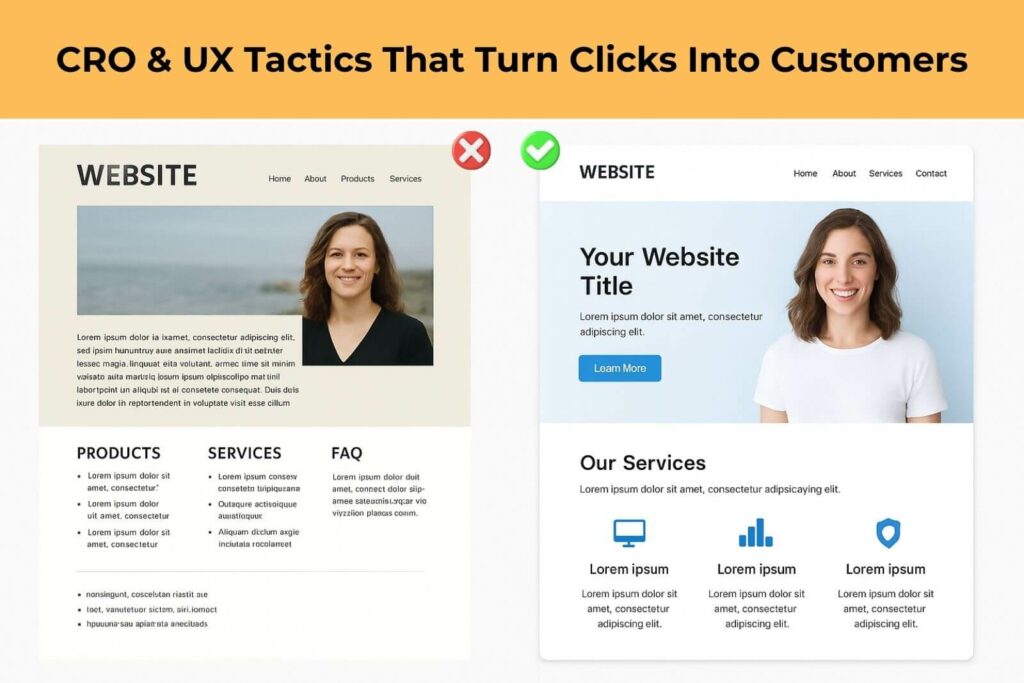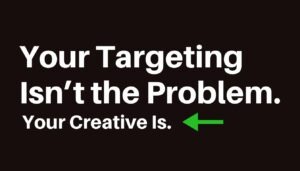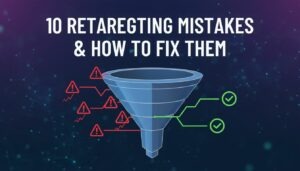Introduction: Why CRO and UX Must Work Together
If you’re driving traffic to your website through ads, SEO, email, or social media—but not getting the results you expect—then it’s time to shift your focus. In 2025, it’s no longer just about getting more visitors. It’s about doing more with the traffic you already have.
That’s where Conversion Rate Optimization (CRO) and User Experience (UX) come in.
When CRO and UX work hand-in-hand, you create digital experiences that convert. You remove friction, build trust, and make it easier for users to take action. Whether your goal is sales, signups, or leads, these tactics can dramatically improve your bottom line without increasing your ad budget.

What Is Conversion Rate Optimization (CRO)?
CRO is the process of increasing the percentage of visitors to your site who complete a desired action—like making a purchase, filling out a form, or booking a call. It’s about understanding what works and optimizing what doesn’t.
The formula is simple:
📈 Conversion Rate = (Conversions / Visitors) × 100
But the practice is more nuanced. CRO includes:
- Analyzing user behavior
- Testing headlines, CTAs, and layouts
- Removing roadblocks to conversion
Instead of spending more to get more visitors, CRO helps you get more from what you already have.
What Is User Experience (UX) and Why It Matters
UX refers to how people interact with your website or product—from the layout and design, to navigation, to how quickly pages load.
Good UX means users can find what they need easily and complete tasks without confusion or frustration.
In 2025, users expect fast, clean, and intuitive websites. If your page is clunky, slow, or overwhelming, people will bounce. They won’t wait around.
UX matters because:
- It builds trust and credibility
- It reduces frustration and bounce rates
- It supports your CRO efforts by guiding the user through a seamless experience
In short, UX is the foundation; CRO is the optimization on top.
CRO + UX: The Winning Combo
You can’t optimize conversions without understanding how people experience your site.
A CRO tweak like “change button color” won’t work if your mobile site takes 7 seconds to load. Similarly, great UX won’t matter if you have a weak CTA or confusing messaging.
When CRO and UX work together, you get:
- Faster, clearer user journeys
- Better retention and lower bounce
- More conversions at a lower cost
Think of CRO as science, and UX as emotion. Together, they influence decision-making.

Top CRO Tactics That Work in 2025
Let’s explore some proven CRO strategies that work well this year:
🧪 1. A/B Testing
Split test headlines, CTAs, product images, or page layouts to find what converts best. Tools like Google Optimize, VWO, or Convert can help you make data-backed decisions.
🎣 2. Exit-Intent Popups
When users are about to leave, show them a last-minute offer, discount, or lead magnet. Done right, this can recover lost conversions.
🛡️ 3. Add Trust Signals
- Customer reviews & testimonials
- Secure checkout badges
- “Free returns” policies
- Money-back guarantees
Trust is a conversion booster, especially in competitive industries.
📣 4. CTA Optimization
Your CTA should be:
- Visible
- Benefit-driven (“Get My Free Trial” instead of “Submit”)
- Consistent across devices

UX Improvements That Boost Conversions
If CRO is about nudging people, UX is about removing friction. Here’s how to improve it:
⚡ 1. Page Speed
Sites that take longer than 3 seconds to load on mobile lose up to 53% of visitors. Tools: Google PageSpeed Insights, GTmetrix.
📱 2. Mobile Responsiveness
In 2025, more than 70% of global traffic comes from mobile. Make sure:
- Buttons are large enough to tap
- Fonts are readable
- Menus are collapsible and clean
🧭 3. Simplified Navigation
Too many choices create confusion. Follow the “one goal per page” rule to keep users focused.
🎨 4. Visual Hierarchy
Use headings, contrast, spacing, and images to guide the eye and emphasize key actions.

Common Conversion Killers to Avoid
Even if you drive qualified traffic, these mistakes can tank your conversion rate:
- ❌ Slow website loading times
- ❌ Too many form fields
- ❌ Confusing page layout or structure
- ❌ Weak or generic calls to action
- ❌ Popups that appear too early or too often
- ❌ Lack of clarity around next steps
Use heatmaps, session recordings, and bounce rate data to identify and fix these roadblocks.
Measuring Success: CRO & UX Tools and Metrics
Don’t optimize blindly. Use data.
📊 Tools to Use:
- Google Analytics 4 (GA4) – Track conversions, drop-offs, behavior flows
- Hotjar / Microsoft Clarity – Heatmaps and screen recordings
- A/B Testing Tools – Google Optimize, VWO, Optimizely
- UX Audits – Lighthouse, GTMetrix, Pingdom
📈 Key Metrics:
- Conversion Rate (CR)
- Bounce Rate
- Time on Page
- Scroll Depth
- Funnel Drop-off Rate
- Click-through Rate (CTR)
When to Focus on CRO vs UX
- Start with UX if your site is confusing, slow, or messy.
- Focus on CRO if you have decent traffic but low conversions.
- Combine both when you want to scale your revenue with existing traffic.
Build for People, Not Just Numbers
In 2025, conversion isn’t about tricks—it’s about trust, clarity, and experience.
If your funnel is broken, no amount of paid traffic will save it. But when your site is fast, focused, and frictionless, your ads, SEO, and content will finally perform.
So instead of chasing more visitors, start optimizing the journey you’ve already built.















